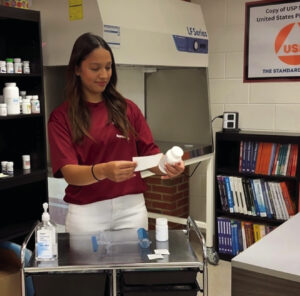Income eligibility increases for Alabama WIC program
by Dustin Duncan
According to the Alabama Department of Public Health (ADPH), the income guidelines have increased for the Special Supplemental Nutrition Program for Women, Infants and Children–better known as WIC. This increase went into effect June 1.
WIC provides nutritious food benefits–such as fresh fruits and vegetables, milk, whole grain cereals and more–to support maternal and child health. Additionally, approximately half of all infant formula in the United States is purchased with WIC. The program is open to participants with incomes up to 185 percent of the federal poverty level. Under the 2022 federal poverty guidelines, more families may be eligible for the program.
“The Auburn University Expanded Food and Nutrition Education Program is pleased to see the increased eligibility for WIC so more Alabamians can benefit from this valuable resource,” said Theresa Mince, EFNEP coordinator with the Alabama Cooperative Extension System.
The new income eligibility guidelines are available through the ADPH website.
Who can apply?
Women who are pregnant, have had a child within the past six months or are currently breastfeeding are eligible to apply for the WIC program through their local county health department or WIC agency. Parents and guardians of children up to the age of five are also eligible. Families that receive Medicaid, Supplemental Nutrition Assistance Program (SNAP-Ed) benefits or Temporary Assistance for Needy Families (TANF) already meet the income qualifications. Even families that do not qualify for these programs may be eligible for benefits because of WIC’s higher income limits.
Those that participate in WIC may receive food benefits for each qualifying family member. There are also increased cash value benefits available for buying fresh fruits and vegetables. Alabama’s program now provides electronic food benefits, making the shopping experience much easier. In addition to food benefits, other program benefits include free nutrition education, breastfeeding support and healthcare referrals.
EFNEP and SNAP-Ed Resources
The EFNEP and SNAP-Ed departments within Alabama Extension provide programs and education to support individuals who receive WIC benefits.
Mince said through interactive, hands-on nutrition education lessons, EFNEP helps participants gain vital knowledge and skills to manage their food resources, keep their food safe and prepare nutritious meals on a limited budget.
“Serving low-income pregnant women/teens and adult caregivers of young children is a primary focus of our program, many of whom are recipients of WIC,” Mince said. “Here in Alabama, 37 percent of all Auburn University EFNEP participants receive WIC benefits. Almost 70 percent of participants in Today’s Mom–our prenatal nutrition education program–receive WIC benefits.”
Auburn University SNAP-Ed also provides a variety of educational resources for WIC participants and other Alabamians with limited resources. Local SNAP-Ed educators provide nutrition education in settings like food pantries, grocery stores and schools. They also work with community partners to increase access to healthy foods and physical activity. SNAP-Ed also encourages Alabamians to “Live Well” through its Live Well Alabama social media platforms and website. Live Well Alabama is a one-stop-shop for daily wellness tips, community success stories and nutrition and physical activity resources
“The increase in eligibility for WIC will help many families in Alabama,” said Katie Funderburk, Alabama Extension SNAP-Ed coordinator. “SNAP-Ed will continue to help those families shop and cook healthy meals on a budget and lead healthy, active lives.”
More information
More information on the WIC program is available on the ADPH website, www.alabamapublichealth.gov/wic/. For more information about Alabama EFNEP, visit ww.aces.edu Find more information about Alabama SNAP-Ed, visit www.LiveWellAlabama.com.








